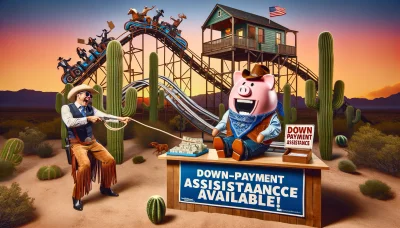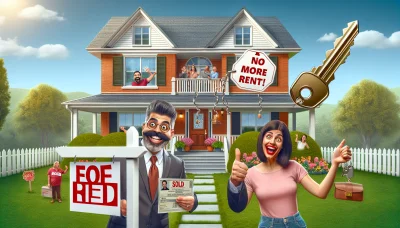How much second home can i afford Quiz
Test Your Knowledge
Question of
Understanding Second Home Affordability
Are you dreaming of a vacation getaway or a place to escape on the weekends? A second home might be just what you need! But before you leap into this exciting venture, it's crucial to grasp the ins and outs of second home affordability. Owning a second home is not just a status symbol it's a lifestyle choice that comes with its own set of financial considerations. From mortgage rates to maintenance costs, understanding the full picture will empower you to make a decision that enhances your life and secures your financial future!
Tips and Best Practices for Second Home Buying
Embarking on the journey of purchasing a second home is thrilling, but it requires strategy and wisdom. Here are some indispensable tips and best practices to ensure you're on the right track:
- Analyze Your Finances: Review your current financial situation meticulously. Ensure you have enough for a down payment, emergency funds, and ongoing expenses.
- Research Mortgage Options: Shop around for the best mortgage rates and terms. Consider fixed-rate mortgages for stable monthly payments.
- Consider Additional Costs: Property taxes, insurance, utilities, and maintenance can add up. Budget for these so they don't catch you off guard.
- Rental Income Potential: If you plan to rent out your second home, research the rental market in the area to estimate potential income.
- Location Matters: Choose a location that not only suits your lifestyle but also holds its value as an investment.
- Tax Implications: Understand how owning a second home will affect your taxes. Consult with a tax professional if necessary.
Mistakes to Avoid When Buying a Second Home
Avoiding common pitfalls can save you from headaches and financial strain down the line. Pay close attention to these mistakes and steer clear for a smoother second home buying experience:
- Ignoring Hidden Costs: Don't overlook costs like HOA fees, repairs, or seasonal maintenance. These can significantly impact your budget.
- Rushing the Decision: Take your time. Rushing into buying a second home without thorough research can lead to regrettable choices.
- Neglecting Insurance Needs: Make sure you have adequate insurance coverage for your second home, including disaster-specific policies if necessary.
- Omitting Future Planning: Consider how your needs might change in the future and whether the second home can accommodate those changes.
- Failing to Consider Resale Value: Even if you're not planning to sell anytime soon, it's essential to consider the potential resale value of your second home.
- Lack of Professional Advice: Always seek advice from real estate experts, financial advisors, and tax professionals before making such a significant investment.
Assessing Your Financial Health for a Second Home Purchase
Are you dreaming of a vacation getaway or an investment property? Purchasing a second home is an exhilarating milestone! But before you leap into this significant financial commitment, it's crucial to take a deep dive into your financial health. Assessing your current financial situation with precision and care is the cornerstone of making a sound investment. Let's embark on this journey together and ensure that your decision to buy a second home stands on solid financial ground, setting the stage for prosperity and peace of mind!
Tips and Best Practices for Financial Assessment
Now, let's talk strategy! To navigate the complexities of buying a second home, you need a robust plan. These tips and best practices are like GOLD follow them meticulously, and you'll be in an enviable position to make your second home dream a reality:
- Review Your Credit Score: An exceptional credit score can unlock favorable mortgage rates. Check your score, correct errors, and improve it if necessary.
- Analyze Your Debt-to-Income Ratio: Lenders love this metric! Ensure your existing debt is manageable compared to your income.
- Consider All Costs: Beyond the mortgage, factor in taxes, insurance, maintenance, and potential rental management fees.
- Build a Robust Emergency Fund: Aim for at least six months' worth of expenses because life loves surprises!
- Explore Financing Options: From traditional loans to HELOCs options abound. Find the best fit for your financial situation.
- Create a Realistic Budget: Be honest about what you can afford. A dream home shouldn't become a financial nightmare.
- Plan for Rental Income: If renting out, project your income conservatively. Vacancies and unexpected costs can happen!
Mistakes to Avoid When Buying a Second Home
A word of caution! The road to purchasing a second home is littered with potential pitfalls. Steer clear of these common mistakes, and keep your journey towards that second home as smooth as possible:
- Rushing the Decision: Take your time. This isn't just any purchase; it's a substantial investment in your future.
- Neglecting Additional Expenses: Don't get blindsided by HOA fees, repairs, or seasonal maintenance costs.
- Overspending: Stick to your budget like glue! Overextending financially can jeopardize both your homes.
- Ignoring Market Trends: Real estate ebbs and flows. Buy smart by understanding current market dynamics.
- Failing to Consider Location Thoroughly: Location impacts value, rental potential, and enjoyment. Choose wisely!
- Lack of Insurance Knowledge: Different homes have different insurance needs. Do the research; be prepared for anything.
- Avoiding Professional Advice: A financial advisor or real estate expert can offer invaluable insights. Don't go it alone!
Calculating the Cost of a Second Home
Are you dreaming of owning a second home? It's an exciting venture, but it's crucial to understand the financial implications before taking the plunge! Owning a second property is not just about doubling the joyit's also about meticulously planning and calculating the costs involved. From mortgages to maintenance, taxes to insurance, every aspect demands your attention. Don't just daydream about that beachfront villa or mountain cabin; get ready to dive into the numbers and make your dream a reality with strategic financial planning!
Tips and Best Practices for Financial Planning
To ensure your journey towards owning a second home is as smooth as possible, follow these essential tips and best practices . They're not just recommendationsthey're the stepping stones to securing your personal paradise without financial hiccups!
- Assess Your Financial Health: Before considering a second mortgage, ensure your debt-to-income ratio is low and your credit score is high.
- Research Mortgage Options: Shop around for the best mortgage rates and terms. Consider fixed-rate mortgages for stable monthly payments.
- Plan for Additional Costs: Factor in property taxes, insurance, utilities, and potential homeowner association fees.
- Budget for Maintenance: Set aside funds for ongoing maintenance and unexpected repairs.
- Consider Rental Income: If you plan to rent out the property, research local rental markets to estimate potential income.
- Explore Tax Implications: Consult with a tax professional to understand how owning a second home will affect your tax situation.
- Create an Emergency Fund: Have reserves in place for unforeseen circumstances that could affect your financial stability.
- Hire Professionals: Engage with real estate agents, accountants, and attorneys who specialize in second-home ownership.
Mistakes to Avoid When Buying a Second Home
Just as important as knowing what to do is understanding what not to do. Avoiding common pitfalls can save you from headaches and financial strain. Keep these mistakes at bay with foresight and careful planning!
- Overlooking Hidden Costs: Never underestimate expenses like property management fees or seasonal maintenance.
- Rushing the Purchase: Take your time finding the right propertyhasty decisions can lead to buyer's remorse.
- Neglecting Research: Ignoring local market trends and property values can result in a poor investment choice.
- Failing to Plan for Vacancies: If renting out, always prepare for periods when the property may not generate income.
- Sacrificing Personal Cash Flow: Ensure buying a second home doesnt compromise your ability to meet current financial obligations.
- Omitting Insurance Considerations: Adequate insurance is vital. Skimping on coverage can be disastrous in case of damage or liability issues.
- Miscalculating Rental Profitability: Be realistic about rental incomefactor in off-seasons and maintenance costs when projecting profits.
- Ignoring Exit Strategy: Always have a clear plan in case you need to sell or change your investment strategy down the line.
Exploring Financing Options for Second Homes
Are you dreaming of a vacation getaway or an investment property? The journey to purchasing a second home is exhilarating, and choosing the right financing option is a critical step that can lead to a sea of opportunities! Whether its a beachfront villa or a cozy mountain cabin, understanding the nuances of securing financing for a second home can unlock doors to your personal paradise or financial growth. Let's dive into the vibrant world of mortgages, interest rates, and loan options designed specifically for your next home away from home!
Tips and Best Practices for Financing Your Second Home
Embarking on the quest for a second home requires savvy navigation! Here's what you need to know:
- Boost Your Credit Score: A stellar credit score can open up phenomenal loan options with lower interest rates.
- Assess Your Debt-to-Income Ratio: Keep it low to show lenders you're a financial superstar!
- Save for a Substantial Down Payment: Aim for at least 20% to sidestep private mortgage insurance.
- Explore Diverse Mortgage Options: From fixed-rate to adjustable-rate, find the perfect match for your financial landscape.
- Consider Rental Income: If you plan to rent out your second home, this could be a game-changer in qualifying for loans!
- Maintain Reserves: Show lenders you're prepared by having extra funds in the bank.
- Shop Around: Don't settle! Compare offers from various lenders to snag the best deal.
Mistakes to Avoid When Financing Your Second Home
Avoid pitfalls on your path to purchasing that dream second home! Steer clear of common blunders that could derail your plans:
- Rushing the Process: Take your time! Rushing could lead to overlooking better financing terms.
- Neglecting Loan Comparisons: Each loan offer has its unique advantages; compare meticulously!
- Ignoring Additional Costs: Beyond the mortgage, consider taxes, insurance, and maintenance expenses.
- Omitting Future Financial Changes: Plan ahead! Ensure your finances can handle future market shifts.
- Failing to Account for Rental Vacancies: If renting out, factor in potential vacancy periods in your budget.
- Sidestepping Professional Advice: A financial advisor can be invaluable. Don't go it alone!
- Lacking Adequate Insurance: Protect your investment with proper insurance coverage. Its crucial!
The Impact of Down Payment on Second Home Affordability
Get ready to dive into the exhilarating world of real estate, where we unlock the secrets behind the mighty down payment and its pivotal role in second home affordability! It's a game-changer, folks! The down payment is not just the initial hurdle; it's a strategic move that can significantly affect your financial trajectory. A larger down payment means lower monthly mortgage payments, less interest over time, and immediate equity in your new property. It's the cornerstone of your investment, setting the stage for long-term stability and financial freedom. Let's embark on this thrilling journey to understand how optimizing your down payment can transform your second home dream into a reality!
Tips and Best Practices for Maximizing Down Payment Impact
Hold onto your seats because we're about to turbocharge your knowledge with some top-tier tips and best practices for maximizing your down payment impact! This isn't just advice; this is the blueprint for success in securing that second home!
- Save Relentlessly: Begin early and be consistent. Every penny counts towards building a substantial down payment.
- Explore Down Payment Assistance Programs: Don't miss out on programs that offer grants or low-interest loans to help with down payments.
- Invest Wisely: Consider investing in low-risk portfolios that can grow your savings without significant risk.
- Budget for Closing Costs: Remember, it's not just about the down payment. Budget for closing costs to avoid surprises.
- Improve Your Credit Score: A higher credit score can lead to better mortgage rates, affecting how much you'll need to put down.
- Negotiate Aggressively: Sharpen those negotiation skills to reduce the purchase price, which can mean less money needed upfront.
Mistakes to Avoid When Saving for a Down Payment
Rally up, future homeowners! It's time to sidestep potential pitfalls with laser focus! Avoiding these common mistakes is crucial when saving for a down payment on your second home. We're talking about safeguarding your financial future and ensuring you don't fall into traps that could jeopardize your goals!
- Avoid High-Interest Debt: Steer clear of high-interest loans or credit card debt that could cripple your saving capacity.
- Dodge Last-Minute Large Purchases: Big-ticket items can waitdon't let them derail your saving strategy.
- Skip Risky Investments: Now is not the time for high-stakes gambles. Protect your down payment funds with safe investment choices.
- Don't Underestimate Costs: Be realistic about all associated costs so you're fully prepared financially.
- Avoid Draining Emergency Funds: Your safety net should remain intactdon't dip into emergency savings for a down payment.
- Bypassing Professional Advice: Enlist experts like financial advisors or realtors who can provide valuable insights and prevent costly errors.
Long-Term Expenses of Owning a Second Home
Are you dreaming of owning a second home? It's a fantastic goal, but let's dive into the reality that comes with it! Beyond the initial purchase price, there are ongoing expenses that can significantly impact your wallet over time. Understanding these long-term expenses is crucial for making an informed decision. We're talking about costs like maintenance, property taxes, insurance, and more. These aren't just numbers; they're factors that could affect your lifestyle and financial health for years to come! So, buckle up as we explore the depths of what it really means to own that dream vacation home or rental property!
Tips and Best Practices for Managing Long-Term Expenses
Get ready to take control of your second home's expenses with some killer tips and best practices! It's all about being proactive and strategic:
- Budget Wisely: Create a detailed budget that includes all potential expenses. Forecasting is your friend here!
- Regular Maintenance: Stay on top of maintenance to avoid costly repairs down the line. Prevention is better than cure!
- Rental Income: If you're not using the home year-round, consider renting it out to offset some costs. Make money while you're away!
- Tax Deductions: Explore tax deductions available for second homeowners. Don't leave money on the table!
- Energy Efficiency: Invest in energy-efficient upgrades to reduce utility bills. Save the planet and your pennies!
- Insurance Review: Regularly review your insurance policies to ensure adequate coverage at competitive rates.
- Local Partnerships: Build relationships with local service providers for better deals on maintenance and repairs.
Mistakes to Avoid with Second Home Expenses
Hear me out! Avoiding common pitfalls can save you from financial headaches in the future. Let's not fall into traps that could turn your dream into a burden:
- Neglecting Ongoing Costs: Never underestimate regular expenses like HOA fees, utilities, and landscaping.
- Ignoring Seasonal Upkeep: Each season brings its own maintenance needs; ignoring them can lead to disaster.
- Failing to Plan for Vacancies: If renting, always have a financial cushion for times when the property may be unoccupied.
- Lack of Proper Insurance: Skimping on insurance can be catastrophic. Ensure you're covered for all possible scenarios.
- Poor Tax Planning: Missing out on tax breaks or mishandling filings can cost you big timestay informed!
- Inadequate Savings for Repairs: Always have a reserve fund for unexpected repairs or emergencies.
- Overspending on Furnishings/Improvements: Keep it reasonable; luxurious upgrades aren't always necessary or cost-effective.
Strategies to Increase Your Buying Power for a Second Home
Are you dreaming of a vacation getaway or an investment property? Look no further! Increasing your buying power when looking for that perfect second home is absolutely within reach! It's not just about having the funds; it's about leveraging them in the most effective way possible. With the right strategies, you can make your dream of owning a second home a vivid reality. It's time to turn those dreams into tangible assets!
Tips and Best Practices to Enhance Your Buying Power
Let's dive into some game-changing tips and best practices that are sure to give your buying power the boost it needs:
- Maintain a Strong Credit Score: A high credit score can lead to better mortgage rates, putting that second home within closer reach.
- Increase Your Down Payment: Save aggressively so you can put down more upfront, reducing your loan amount and interest payments.
- Reduce Existing Debt: Lowering your debt-to-income ratio makes you more attractive to lenders and can help secure a favorable loan.
- Consider Multiple Financing Options: Shop around! Don't settle on the first mortgage offer. Explore different lenders for the best terms.
- Improve Your Income Streams: More income means more borrowing power. Consider side hustles or rental income from your first home.
- Negotiate Aggressively: When you find that second home, don't be shy. Negotiate terms that align with your financial goals.
- Stay Informed on Market Trends: Understanding the real estate market can help you time your purchase to get maximum value for money.
Mistakes to Avoid When Buying a Second Home
Avoiding common pitfalls is just as important as following best practices. Here's what NOT to do when you're in the market for a second home:
- Overspending on a Property: Stick to your budget! Falling in love with a property that's outside of your financial comfort zone can lead to long-term regret.
- Neglecting Additional Costs: Remember, there's more than just the mortgage. Factor in taxes, insurance, maintenance, and potential homeowners' association fees.
- Rushing the Process: Take your time! Rushing into a purchase without proper due diligence can expose you to unforeseen problems.
- Failing to Consider Rental Potential: If you're not using the home year-round, rental income can help cover costs. Think ahead about the property's rental appeal.
- Ignores Liquidity Needs: Ensure you have enough liquid assets available for emergencies without having to sell the property at a loss.
- Lack of Proper Insurance: A second home may require additional types of insurance coverage. Be thorough and protect your investment appropriately.
- Miscalculating Resale Value: Invest in a property that will likely appreciate over time rather than choosing based solely on emotion or aesthetics.












